-
 +14 +1
+14 +117-pound meteorite discovered in Antarctica
Antarctica is a tough place to work, for obvious reasons—it's bitterly cold, remote, and wild. However, it's one of the best places in the world to hunt for meteorites. That's partly because Antarctica is a desert, and its dry climate limits the degree of weathering the meteorites experience.
-
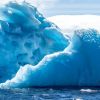 +4 +1
+4 +1Torrents of Antarctic meltwater are slowing the currents that drive our vital ocean 'overturning' – and threaten its collapse
In a plot reminiscent of the 2004 movie The Day After Tomorrow?, Australian scientists are warning that the Southern Ocean’s deep “overturning” circulation is slowing and headed for collapse.
-
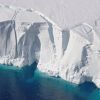 +16 +1
+16 +1Antarctic ocean currents heading for collapse- report
Rapidly melting Antarctic ice is causing a dramatic slowdown in deep ocean currents and could have a disastrous effect on the climate, a new report warns. The deep-water flows which drive ocean currents could decline by 40% by 2050, a team of Australian scientists says. The currents carry vital heat, oxygen, carbon and nutrients around the globe.
-
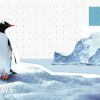 +11 +1
+11 +1Antarctica sea-ice hits new record low
Sea-ice measurements in Antarctica have registered a new minimum, breaking the record set only one year ago.
-
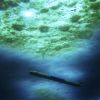 +16 +1
+16 +1A skinny robot documents the forces eroding a massive Antarctic glacier
Scientists got their first up-close look at what's eating away part of Antarctica's Thwaites ice shelf, nicknamed the Doomsday Glacier because of its massive melt and sea rise potential, and it's both good and bad news.
-
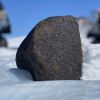 +12 +1
+12 +1Scientists find 17-pound meteorite in icy Antarctica
A daring team of scientists has endured the inhospitable conditions of the icy desert of Antarctica to recover five new meteorites, including a near-17-pound monster space rock. The team of scientists included Field Museum and the University of Chicago researcher Maria Valdes, who estimated that of the 45,000 meteorites recovered to date from the icy wasteland of Antarctica, only 100 or so have been as large as the largest member of this new haul, which weighs 16.7 pounds (7.6 kilograms).
-
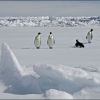 +13 +1
+13 +1Scientists discover new emperor penguin colony in Antarctica - by spotting their poo from space
The colony, located at Verleger Point, West Antarctica, is home to 500 birds. It brings the total of known emperor penguin sites around the continent to 66, according to scientists at the British Antarctic Survey.
-
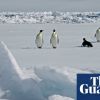 +16 +1
+16 +1Scientists discover emperor penguin colony in Antarctica using satellite images
A newly discovered emperor penguin colony has been seen, using satellite images of one the most remote and inaccessible regions of Antarctica. The colony, home to about 500 birds, makes a total of 66 known emperor penguin colonies around the coastline of Antarctica, half of which were discovered by space satellites. The climate crisis is posing an existential threat to these colonies, as sea ice is rapidly melting.
-
 +18 +1
+18 +1Emperor penguin at risk of extinction, along with two-thirds of native Antarctic species, research shows
Two-thirds of Antarctica’s native species, including emperor penguins, are under threat of extinction or major population declines by 2100 under current trajectories of global heating, according to new research that outlines priorities for protecting the continent’s biodiversity.
-
 +21 +1
+21 +1Over 100 years of Antarctic agriculture is helping scientists grow food in space
Scientists just grew plants in soil from the Moon, but Antarctica has long provided researchers with the perfect place to test their agricultural techniques for a future in space.
-
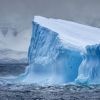 +16 +1
+16 +1Scientists discover a giant groundwater system under the ice sheet in Antarctica
Have you ever stared at the long ice sheets in the Antarctic and wondered what lies beneath? Now, Columbia University researchers have explored this question and found an answer that may surprise you, according to a study published in Science on Thursday.
-
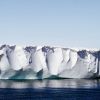 +16 +1
+16 +1Vast underground water system helps drive Antarctica’s glaciers
Lake Whillans is a strange body of water, starting with the fact that there is liquid to fill it at all. Though buried under more than 2,000 feet of Antarctic ice, its temperatures climb to just shy of 0° Celsius, thanks to a combination of geothermal warmth, intense friction from ice scraping rock, and that thick glacial blanket protecting it from the polar air. Given the immense pressure down there, that’s just balmy enough to keep the lake’s water watery.
-
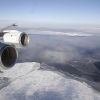 +15 +1
+15 +1East Antarctica ice shelf size of New York City collapses amid accelerated melt
Scientists are concerned because an ice shelf the size of New York City collapsed in East Antarctica, an area that had long been thought to be stable.
-
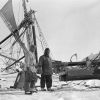 +26 +1
+26 +1Endurance: Shackleton's lost ship is found in Antarctic
What was one of the world's greatest undiscovered shipwrecks is identified on the Antarctic seafloor.
-
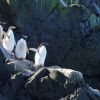 +13 +1
+13 +1Scientists Use Penguins to Study Antarctic Climate Change
Scientists researching climate change in Antarctica are studying penguins in an effort to better understand the area’s environmental health. The scientists are measuring the growth and development of the penguin population on the eastern side of the Antarctic Peninsula. Reuters news agency recently reported on studies in the area carried out by two American researchers.
-
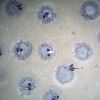 +4 +1
+4 +1Biologists Shocked to Find Millions of Icefish Nesting Near Antarctica
Deep-sea biologists were stunned to find the largest known fish breeding ground, a discovery made last year near Antarctica. Details of the incredible find were published today, with researchers describing a sprawling colony of millions of icefish on seafloor of the Southern Ocean.
-
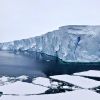 +13 +1
+13 +1'The Fuse Has Been Blown,' and the Doomsday Glacier Is Coming for Us All
One thing that’s hard to grasp about the climate crisis is that big changes can happen fast. In 2019, I was aboard the Nathaniel B. Palmer, a 308-foot-long scientific research vessel, cruising in front of the Thwaites Glacier in Antarctica. One day, we were sailing in clear seas in front of the glacier. The next day, we were surrounded by icebergs the size of aircraft carriers.
-
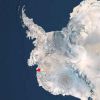 +19 +1
+19 +1Scientists watch giant ‘doomsday’ glacier in Antarctica with concern
Twenty years ago, an area of ice thought to weigh almost 500bn tonnes dramatically broke off the Antarctic continent and shattered into thousands of icebergs into the Weddell Sea. The 1,255-sq-mile (3,250-sq-km) Larsen B ice shelf was known to be melting fast but no one had predicted that it would take just one month for the 200-metre-thick behemoth to completely disintegrate.
-
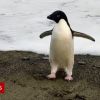 +15 +1
+15 +1Rare Antarctic penguin accidentally travels 3,000km to New Zealand
Pingu the penguin was spotted by a local resident who thought he was a "soft toy" at first.
-
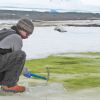 +4 +1
+4 +1Climate change will turn coastal Antarctica green, say scientists
Scientists have created the first ever large-scale map of microscopic algae as they bloomed across the surface of snow along the Antarctic Peninsula coast. Results indicate that this ‘green snow’ is likely to spread as global temperatures increase.
Submit a link
Start a discussion




















